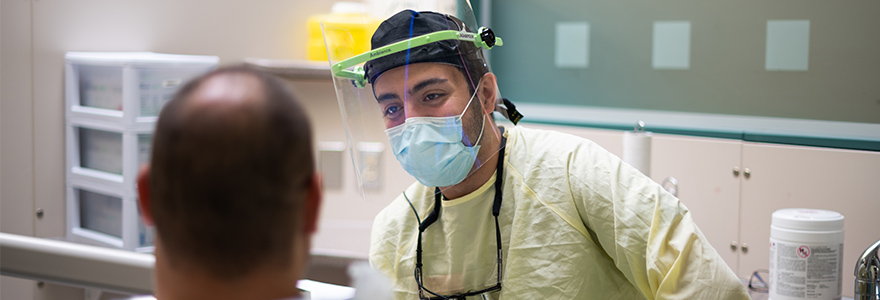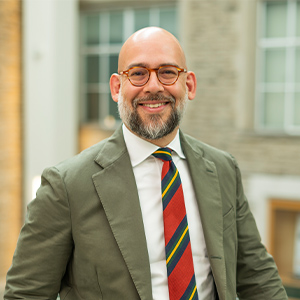Building the dental school of the future

By Communications
With a new leader and a renewed mission to be of service to its patients, Dentistry is moving forward with new energy at Schulich School of Medicine & Dentistry.
Dr. Carlos Quiñonez was appointed vice dean and director, Dentistry, in June 2022. And what he has seen during the first six-plus months has confirmed his belief that “students, staff, faculty, alumni, and leadership are committed to achieving positive change and growth.”
In this Q&A, Quinonez outlines the opportunities and challenges ahead in building a dental school of the future.
What attracted you to Schulich Dentistry?
Having built a successful research and graduate program during the previous 12 years, I was ready to take a more formal step into academic leadership and administration. Schulich Dentistry was of particular interest to me given the size of the School, and what I perceived to be a great opportunity to build a dental school of the future.
 Dr. Carlos Quiñonez, Vice Dean and Director, Dentistry
Dr. Carlos Quiñonez, Vice Dean and Director, Dentistry
Describe the School as you saw it then? What were its opportunities and strengths?
Schulich Dentistry long enjoyed a stellar reputation in the dental community. Then, for a number of internal and external reasons that were common to all dental schools in North America, difficulties developed in the 1990s and 2000s. Given the challenges experienced over this time, it was clear from my conversations with leaders at Schulich Medicine & Dentistry, the School was thirsty for change.
In my opinion, the School has some key strengths and opportunities that are not present in all dental schools. It has good capital infrastructure, alumni that are loyal and ready to help when called upon, committed students, staff and faculty, and committed leadership within Schulich Medicine & Dentistry and Western University, more broadly.
Now that you are about six months into your term, what have you seen that confirms your early observations?
With six months under my belt, I can tell you with certainty that the School enjoys the strong support of Schulich Medicine & Dentistry and Western. What has filled me with the most pride, though, is confirming that students, staff, faculty, alumni, and leadership are committed to achieving positive change and growth. They have stepped up to my calls to action and have demonstrated a work ethic that would raise the confidence of any leader.
What do you want Schulich Dentistry to be known for by its audiences?
I want Schulich Dentistry to be known for embodying its new mission and vision, which is to be of service to our patients, our community, and each other, and to be the best. By the first, I mean I want potential and current students, alumni, faculty and staff to understand that, in addition to learning the technical skills required to be a dentist, one comes to Schulich Dentistry to learn the dispositions of character that are expected of health care professionals – integrity, compassion, excellence, accountability, amongst others.
Secondly, we will strive to be better than we were yesterday, in the service of our patients, our community, and each other. And of course, I want potential and current students, alumni, faculty and staff to know that, at Schulich Dentistry, they will receive or are part of delivering the best dental education one can get.
What strengths do you have to build on as you progress towards that goal?
In order to successfully progress with this mission and vision, we need to engage in governance, curriculum, operational, and infrastructural renewal. This means building strength within administration and management (e.g., a new leadership structure, processes, and policies), increasing our faculty complement, designing and implementing a new curriculum that meets the needs of current and future students and patient populations, becoming a data-rich and learning organization, being efficient in our use of resources, and leveraging existing and new opportunities to improve our hard and soft infrastructure (e.g., capital, hardware, and software).
What happens if we don’t change?
If we don’t change, then we keep moving forward in uninspired ways. For instance, we won’t effectively provide the best clinical care to the city and region’s most vulnerable groups, and we won’t produce the dentists that society needs. In other words, we will fail to be the best that we can be for our patients, our community, and each other.
Describe the competitive environment that Schulich Dentistry faces in Canada and globally?
I do not like to think of things using a competitive lens. If we concentrate on ourselves and make ourselves the best that we can be, everything else falls into place.
What are some of the external challenges the Dentistry School faces?
I don’t think in terms of challenges. I like to think of opportunities and, in that regard, there are many. For instance, governments have increasingly focused their attention on dentistry in the context of the United Nations’ Sustainable Development Goals, specifically the aim to include oral health care within universal health coverage packages. The recent announcement of a new federal dental care program that will be national in scope is one example, and this is something that Schulich Dentistry can significantly contribute to in terms of training, research, and service delivery.
What is the School’s secret weapon as it moves forward?
The school’s secret weapon is its committed staff and faculty. Without their hard work, we can do very little.








